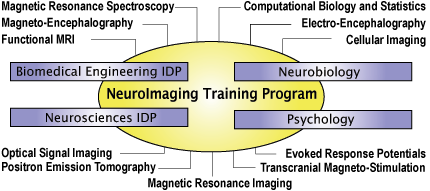| Faculty | Contact |
FAQ | Home | Summer Program |
neuroscience, magnetic resonance, functional mri, fMRI, neurosurgery, brain mapping, cognitive neuroscience, eeg, positron emission tomography, ucla, neuroimaging, pulse sequences, alzheimer, parkinson, perception, neurophysiology, magnetic resonance imaging, functional magnetic resonance imaging, cognition, psychology, epilepsy, PET, optical intrinsic signal, OIS, QEEG, magnetoencephalography, MEG, spectroscopy, nih, nimh, spm, fsl, afni, macine learning, physics. electroencephalography, electrophysiology, imaging, rf coil, diffusion, tractography, connectome, big data
The NeuroImaging Training Program Curriculum
Within the UCLA NeuroImaging Training Program, the emphasis is on the merging of two disciplines: Neuroscience and Imaging. Students will be admitted to the NITP principally through through four established Graduate Programs: the Interdepartmental Graduate Program in Biomedical Engineering (BME IDP), the Interdepartmental Program in Neuroscience (NS IDP), the Department of Psychology and the Department of Neurobiology. Neuroimaging faculty serve on the relevant Admission Committees and understand fully the mission of the neuroimaging program. Trainees will have finished their required basic first year coursework in the PhD program of entry and will be awarded one year of support through the training grant. All students will be expected to submit applications for an NRSA award or equivalent fellowship, as we believe that grant writing should be an integral component of training. The mentor must commit to funding and supporting the trainees for the remainder of their degree program.

|
Below is a representative curriculum for students entering through the NeurosciencesIDP. The details will be somewhat different for those coming in through Biomedical Engineering, Neurobiology or Psychology, reflecting differences in the departmental requirements, but the same core areas will be covered. The courses specific to the NITP are required regardless of the department of entry. NSIDP students will start a first-year curriculum consisting of four Neuroscience core courses as well as a new seminar on imaging in neuroscience, an option that will be available to all IDP students. Students also take a required course in research ethics; some elect to do so in their second year. The curriculum in the neurosciences is intensive and comprehensive. |
NITP trainees will have the classroom background common to students electing to pursue more traditional work in the neurosciences. During their first year, the students begin their exposure to the unique features of the Neuroimaging Program. Each student will complete two laboratory rotations: one in a neuroscience laboratory and one in an imaging laboratory. They are encouraged to undertake a collaborative project that could be explored in both rotation laboratories. Before advancing formally into the NITP, students will be required to show competence in the areas of 1) Integral calculus 2) Statistics 3) Electricity and Magnetism 4) Computer Programming (any language) all of which are fundamental to advanced work in neuroimaging. The core course, "Principles of Neuroimaging ", will be taught in the second and third quarters. Therefore, NITP students will be encouraged to use the first quarter of their second year to take advanced undergraduate courses in Engineering or Neuroscience to fill potential gaps in their prior education prior to their competency exam. The table below shows a typical course sequence for the required components of the NITP. The required NSIDP courses are shown above, and the required NITP courses below. The bold faced course titles, “Evaluation of Research Literature in Neuroimaging” and, "Principles of Neuroimaging " are new offerings specifically for the NITP.
| Year 1 | Year 2 | |||||
|---|---|---|---|---|---|---|
| Q1 | Q2 | Q3 | Q1 | Q2 | Q3 | |
| NSIDP | M202. Cellular Neurophysiology |
M203. Neuroanatomy M204. Synapses, Cells and Circuits |
205. Systems Neuroscience 207. Integrity of Scientific Investigation |
Biomathematics + Three advanced Neuroscience or Neuroimaging Courses | ||
|
(Psych) |
250A Statistics Psy251A |
250B. Statistics 251B.Research Methods M203. Neuroanatomy |
251C Research methods |
|||
| NITP | Neuroscience 596: Research Rotations – Imaging and Neuro | 292 Functional Neuroanatomy | Principles of Neuroimaging | |||
|
Evaluation of Research Literature in Neuroimaging
|
||||||
Students entering through the Cognitive Neuroscience Program in Psychology will receive training in similar material, following a slightly different sequence, as indicated. The interactions of the programs in neurobiology and biomedical engineering, though not yet finalized, will be similar.
The two quarter sequence, "Principles of Neuroimaging " considers common factors in neuroimaging and will serve to integrate the program across imaging modalities through the study of shared aspects of imaging: detection theory and physics, transform approaches, time-series statistics, contrast agents (e.g., magnetonanoparticles), multimodal synthesis, physiological contrast. This course will also provide background in modality-specific technology that trainees can use in their advanced studies. The outline for the course is:
|
|
Mentorship, Career Development and Responsible Conduct of Research
On entry into the program, students will be assigned two faculty mentors one each in neuroscience and imaging. The Co-mentors will advise the students programmatically to help them select the best curricular path, monitor their performance, and to prescribe remedies as needed. Specific attention will be paid to the career development of students. NITP students will take two seminar courses: (1) Scientific Communication and (2) Strategies for Translational Research. The first addresses problems of scientific communication, ranging from the preparation of fellowship and grant applications to the presentation of scientific and technological news to the lay public. The second course deals with problems in bringing scientific and technological discovery to practice. Topics will include industrial partnerships, entrepreneurship, clinical trials, and regulation (e.g., by the FDA). The yearly retreats will have special focus groups dedicated to this topic with participants from academia and industry. These events will also provide the opportunity to invite back the successful graduates of our program to discuss their career experiences to the students. The optional industrial internships will expose self-selected students to diverse environments.
The UCLA Neuroimaging Training Program is funded by generous awards from the National Institutes of Health, grant numbers R90 DA022768 and T90 DA023422
